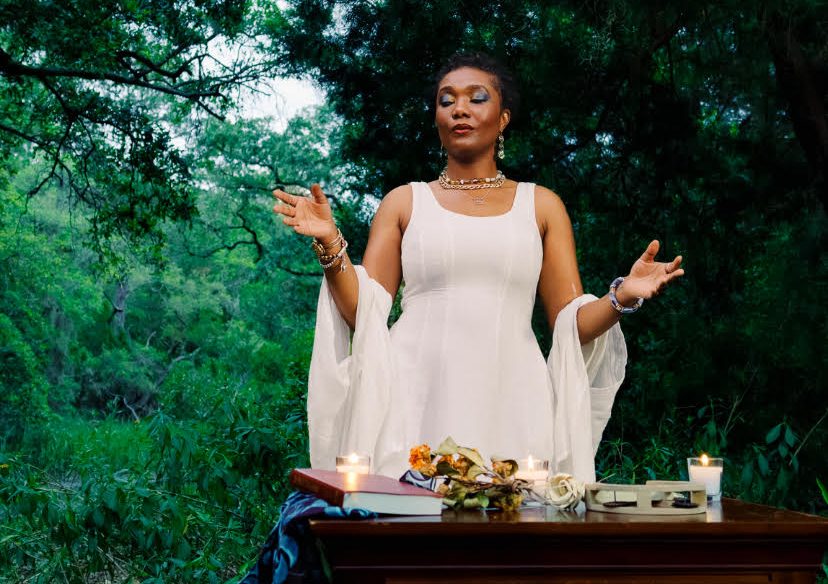
From ‘Witchcraft’ To Wisdom: How Black Women Are Embracing Ancestral Spirituality Miscast As ‘Demonic’
Credit: Jupe Javeta
Many of us grew up in pews where faith was rigid, not fluid. We were taught that God lived in the sky, the devil lurked everywhere else, and anything that hinted at “the unknown” was dangerous. For some of us, that meant not being allowed to watch Harry Potter or read books with “magic” in them, because the slightest brush with the occult was believed to open the door to demons.
Those lessons carried into how we consumed culture, too. Black characters who tapped into spirit, nature, or magic were usually cast as villains—witch doctors, voodoo queens, or shadowy figures lurking in the background. Our survival technologies were never the hero’s tools; they were the enemy’s. The unknown, we were told, was demonic.
That script hasn’t changed much. A resurfaced clip of actor Michael B. Jordan mentioning that he got his middle name from a babalawo—a Yoruba priest trained in the Ifá divination system, not something he himself claims to be—sparked online comments of people “canceling” him for being “demonic.” The mere mention of ancestors has people calling Beyoncé a witch. Even affirming the presence of spiritual gifts gets twisted: Tabitha Brown, whose faith and joy are rooted in Christianity, has been labeled the same.
For Black millennial women raised in that world, curiosity about ancestral practices often comes with fear. Yet something is shifting.
Recent storytelling has cracked the door. The 2025 film Sinners didn’t flatten Hoodoo into horror; its representation centered on a practitioner, Annie, as the story’s moral compass. That shift matters, but walking through the door takes guides who live this work. Enter cultural worker and fifth-generation Gullah Geechee diviner Sara Makeba Daise, whose forthcoming book Sankofa Shadow Work: Diaries of a Diasporic Diviner offers a way to name what so many of us already feel in our bones.
In mainstream memory, many first met Daise as a child on Gullah Gullah Island, the beloved 1990s Nick Jr. series. She starred alongside her parents, Ron and Natalie Daise, and her brother, actor Simeon Daise. While the show introduced a generation to Gullah culture through music and storytelling, Sara’s adult work builds on that foundation in deeper ways—connecting pop culture’s bright snapshots to the lived realities of ancestry, ritual, and reclamation. Daise recently shared insights with MadameNoire ahead of her book’s Oct. 24 release.
October is both Gullah Geechee Heritage Month and Hoodoo Heritage Month. The Gullah Geechee people are descendants of enslaved Africans who lived along the coasts of South Carolina, Georgia, Florida, and North Carolina. Known for preserving more African traditions than almost any other African American community, the Gullah Geechee retained language, foodways, and spiritual practices across centuries of oppression. Hoodoo—also called root work or conjure—emerged within that same landscape of survival. It is a set of African American spiritual practices rooted in African cosmologies, Indigenous knowledge, and the necessity of living under slavery and Jim Crow. It is a closed practice, meaning it is specific to the African American experience and not open for outsiders to appropriate. The overlap of these two heritage months is no coincidence. Hoodoo and Gullah Geechee traditions are inseparable.
Pop culture has been dropping breadcrumbs toward this return for years. Beyoncé’s Lemonade sent many viewers searching for the 1991 film Daughters of the Dust, Julie Dash’s portrait of Gullah women preserving memory on the Sea Islands. Tina Knowles’ new memoir, Matriarch, affirms the power of mothers and grandmothers as keepers of story and spirit. Even network dramas like Will Trent nod to conjure, putting what was once whispered in family kitchens on primetime screens. The signals are everywhere. The question is what we do with them.
Credit: Mariah Webber
RELATED CONTENT: Hoodoo Heritage Month: Conjuring, Culture, And Community
The post From ‘Witchcraft’ To Wisdom: How Black Women Are Embracing Ancestral Spirituality Miscast As ‘Demonic’ appeared first on MadameNoire.
Source link
#Witchcraft #Wisdom #Black #Women #Embracing #Ancestral #Spirituality #Miscast #Demonic
powered by Auto Youtube Summarize
Categories Music News TV And Film
Tags Ancestral Black Christianity Daise Demonic Embracing Georgia Gullah Geechee Matriarch Miscast Sankofa Sara Makeba Daise Sinners Spirituality Wisdom Witchcraft Women
